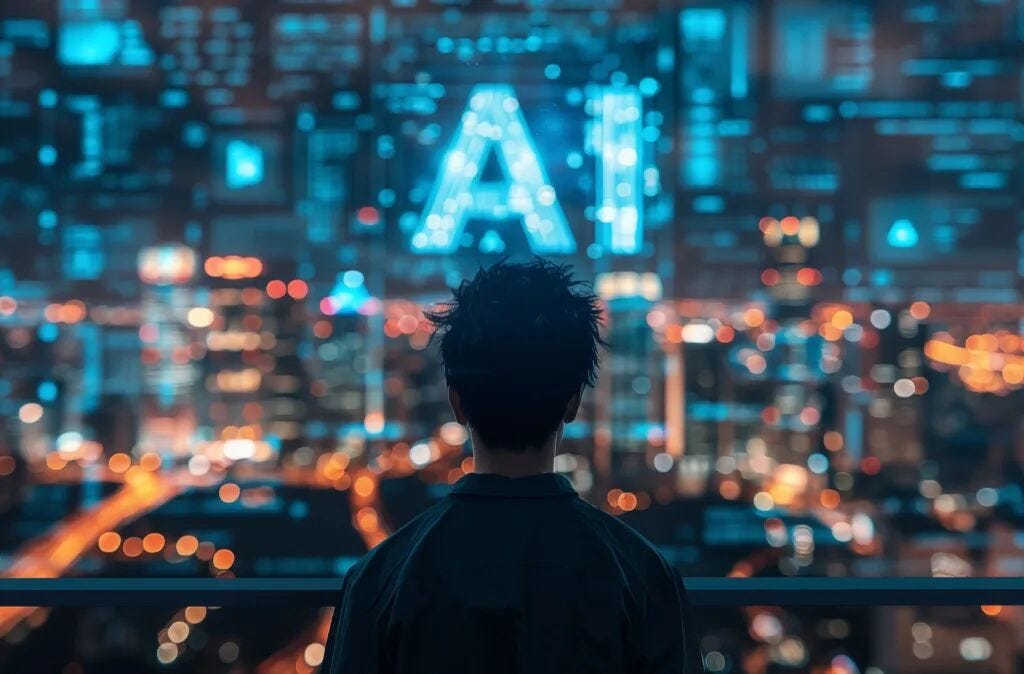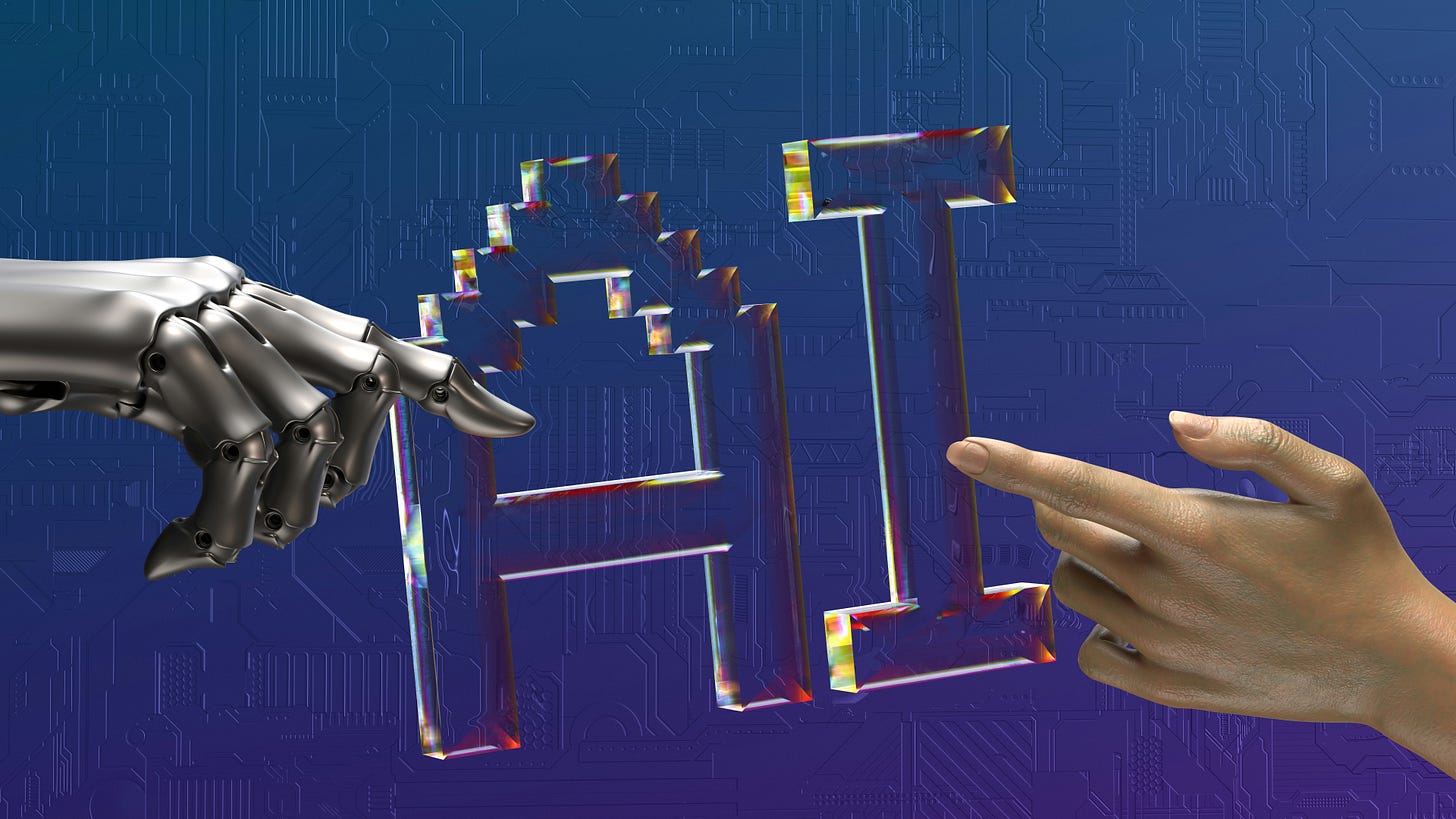A Chinese civil servant's AI headache
"Efficiency doesn't double, but the workload does."
DeepSeek's breakout at the start of the year marked, in many ways, the moment AI truly went mainstream in China.
AI's ripple effects have also reached deep into the state apparatus (tizhi), where civil servants in some regions are now required to use AI tools to boost efficiency.
Their workloads haven't shrunk; if anything, they start to feel like that they're "working for the AI," according to a telling story published on July 25 on the Mammoth Times (猛犸工作室) WeChat account.
Moreover, China's uniquely coded bureaucratic language makes this human–machine pairing even more interesting.
Mammoth Times is the in-depth reporting unit of the Guangzhou-based business weekly The Time Weekly 时代周刊, founded in 2008 and overseen by Guangdong Publishing Group.
Below is my full translation of that story.
一个基层科员的AI烦恼
An Entry-Level Civil Servant's AI Headache
Sun Tongna, 34, is a junior clerk in a government department in a second-tier city in the Yangtze River Delta. After AI was added to the office system, his life changed.
"Efficiency doesn't necessarily double, but the workload definitely does."
Most of Sun's work involves text. In the past, his desk was often piled with paper materials to prepare speeches for various occasions. For a single speech, he would go through a first draft, a revised draft, a draft reviewed by the supervising leader, a finalized draft, a formatted draft, and a printed version, altogether taking about two days.
Now, the paper has been filed away in a corner cabinet, replaced by two AI writing apps pinned to his computer desktop. For remarks and summary reports (the routine documents), he lets AI draft first and then polishes and submits. When superiors ask for changes, he pastes their notes into the chat box and has AI execute them.
"Work has turned me into a 'megaphone' — anything the boss doesn't want to say directly to AI, I pass along," he says with a wry smile.
After a few months, he has more or less adapted.
The office smoking area has become the place where he and colleagues vent after adapting. On paper, two days of work looks like something AI can finish in minutes. But whether it's usable, and whether it's right, you only know after you've tried it.
It (AI) does produce "work," but for the people training AI, new headaches have arrived. That is how Sun and some colleagues feel.
In sweeping narratives, AI is branded a "tool that frees up our hands." In reality, it's more like a one-way pane of glass, reflecting the most trivial and most real side of office life: efficiency and order, technology and emotion, commands and human judgment, all tangled together.
I. Before becoming an "AI civil servant"
In fact, Sun says AI entered his and his colleagues' world earlier than outsiders might think.
In the summer of 2024 , his department held a meeting titled "AI Empowerment," discussing how artificial intelligence could be used in daily office tasks. Fewer than 20 people work in his unit; most are under 35 and many have humanities backgrounds. After the meeting, no one took it too seriously.
A few months later, AI formally entered their field of vision.
That October, he and his colleagues were told to "get familiar with AI tools", "try the software and figure out what actually works."
That was the prelude to change.
Overtime came first. The original workload already felt heavy. Now he and his colleagues had to use their off-hours to complete trial assignments. The same question fed into different AI apps yields completely different answers. He had to sift through the mass of responses to find the option his leaders would deem reliable.
That was just the theory. The practical work took even more time.
He and his colleagues were told to sort out the problems encountered at the government-service counters, write down everything they heard, saw, or could think of, feed it into a trial AI system, and see if it could produce effective replies.
"It all came back as templated answers," Sun says, "not very useful. Lots of problems can't be answered by a pre-set template." One real case: an elderly man brought a stack of caregiver résumés and asked staff to run background checks. "How do you answer that with AI ?" But the presence of AI makes people feel it can do anything.
Whether the software is "good" is not the point; his task is to write clear, logical usage notes and propose suggestions that would let the software actually empower frontline work.
Sun spent an evening writing about 600 words of trial feedback. At the end he added, "The problems encountered at the hall span every aspect of citizens' lives, and this report cannot list them exhaustively and is provided for reference only."
"What I really meant was: we are understaffed, and colleagues are already working flat out," Sun says. Because of confidentiality, much of the work can't be given to interns or outsourced; only internal staff can explore and test. "That eats into a lot of our original work time."
If that was just the warm-up, then the flurry of steps around the Spring Festival in 2025 marked AI's full entry into Sun's job.
Over the holiday, his team chat filled with news and demo videos of models like DeepSeek. The leaders kept urging: "Use the break to get familiar. This is a post-holiday priority."
On the first day back, the kickoff meeting focused on how "AI will profoundly change office work."
Sun tossed a prompt to AI: write a mobilization speech for an AI kickoff meeting. He kept entering instructions, and the interface kept throwing errors: "Server busy, please try again later."
After stop-and-go experiments, he assembled a paragraph: "Approach and learn new technologies proactively, master large models like DeepSeek , and use AI to assist decision-making and analysis. Combine 'human brain + AI' to build capability and improve quality and efficiency."
His understanding: increase efficiency first. The main thing is to complete assignments from above, and AI can help him respond faster.
Quality comes next. "You can't use AI's quick output as-is; I have to read and revise line by line before it's done." For speeches, AI can't fully capture someone's intent; in the end he spends time, sometimes overtime, training AI. That may conflict with the goal of efficiency.
Even so, the link between AI and government work has spread across scenarios.
For example, in February, many localities plugged DeepSeek into government systems with local deployment, applying it across the chain from document processing to public services, emergency management, and investment promotion.
The topic trended on Weibo, and "AI civil servants" briefly became a buzzword.
"Will AI really replace us?" Sun and his colleagues did wonder.
II. Has the overtime shrunk?
Even before that answer, Sun felt some conveniences AI brought.
"It has lightened the load. It can be used in a lot of basic work, and sometimes helps catch text errors."
His department is document-heavy: writing and revising all day. Speeches, minutes, notices, research reports—a full document typically goes through five or six rounds of edits, sometimes more than ten.
When AI was first introduced, Sun and his colleagues were pleased.
Thanks to AI, a speech has a "first draft"; a report can "get a head start"; a summary can be auto-outlined with keywords and logic. More importantly, AI truly saves time on tedious but necessary tasks, including merging ten files into one, extracting key points from long materials. "AI is pretty reliable there."
For a while, his overtime did shrink. But that golden period was brief.
Not long after, AI spreads across the office platform.
The latest AI platform Sun uses integrates three functions: government Q&A, administrative writing, and official-document drafting. Through a "template window," he can enter a title and keywords to auto-generate many routine documents.
On the surface, such tools should greatly reduce manual pressure. One report said that on its launch day, Shenzhen's AI government assistant answered more than 8,000 questions and now helps over 2,000 citizens a day.
But when the work gets specific, Sun says it still comes down to people. AI can replace the first line of front-desk inquiries, but complicated issues still need a human backstop. "Citizens' questions are all over the map; not everything can be answered from a folder."
The pace of AI entering government work is accelerating. In April, his city released a Three-Year Action Plan for High-Quality Development, which explicitly called for deepening the "AI +" initiative.
In other words, AI now touches more work scenes.
The feedback windows got shorter; Sun and his colleagues were forced to work faster and better. Some raised concerns privately and were told to learn to use AI tools quickly. "After all the effort to deploy AI, we can't let it sit there as a showpiece."
So he used AI more often, spent more time training it, and ended up working more overtime.
III. "It feels like working for AI"
For all the talk of AI-government integration, Sun feels something is still missing.
He gives an example: he needed to write a speech on "how AI can support grassroots governance." After the prompt, AI produced 1,200 words in 20 seconds, full of stock official phrases: empower the grassroots, reshape governance models, build a smart city…
The supervising leader looked it over and asked, "Do you understand what I'm trying to say?"
Sun didn't dare answer. He knew what that meant: AI doesn't grasp the difference between "what to say" and "how to say it," nor does it sense the weight of wording in different settings, such as how far a line should go.
For instance, a leader might tweak a few words in the margin: "promote 推动" becomes "deepen 深化," "remarkable results 成效显著" becomes "phased progress 阶段性成果," "vigorously implement 大力落实" becomes "advance in an orderly manner 有序推进."
The changes are small, but the meaning shifts. "Certain terms have to be used with precision," he says.
A document carries more than literal content. It also encodes the distance and tacit rules between higher-ups and subordinates. AI can't read between the lines, can't learn "white space," and can't "gauge the degree."
In the end, he had to start over. He later changed tactics — let AI draft, then dismantle and rebuild; sometimes he treats it like a phrase bank and scavenges usable adjectives.
"I increasingly feel like I'm working for AI."
This back-and-forth hasn't raised efficiency; it's become an extra burden.
Inside the state apparatus, information security is another constraint. A former search-engine engineer told Time Weekly that for many government offices, data security is a top priority.
That means the computers on desks may not be ready for the speed AI demands.
Sun's six-year-old machine roars after loading two AI apps. If he opens a Word file, a web page, and the AI platform together, the system pops up a warning: "High memory usage. Consider closing windows."
One afternoon, while handling three files and feeding dozens of prompts to AI in one go, the system crashed. Hours of work were unsaved. He just sat in his chair, staring at a black screen.
"AI and we may be dragging each other down. Strong AI, weak hardware…"
A bigger problem is that the AI data pool is a half-true, half-false hybrid that generates errors with a straight face.
Once, Sun had to write "an overview of his city's AI applications over the past three years." AI listed five "key achievements," two of which were fabricated and complete with numeric indicators. Tracing the sources, he found the system had pulled "similar region" documents — right format, wrong facts.
The root issue is that AI is still learning. Much local government data can't go online, can't be ingested, can't be used as training base. With stale back-end updates, model outputs will have holes. It can apply templates fluently but struggles to judge truth.
So Sun learned a routine: first doubt AI, then verify AI, then "rewrite AI."
In a way, it's like how he copied from books as a kid: write it down, memorize it, cross it out and write it again, until it sounds like his own words.
IV. Still living with AI
Kai-Fu Lee once said: by 2033, 40% of jobs will be replaced by AI. People's dreams and professions may be nibbled away without them noticing. The deeper crisis isn't unemployment, but "losing the value of being human."
In his book "AI 2041: Ten Visions for Our Future," Lee painted a scene: workers replaced by AI are parked in a room, using VR to operate a non-existent construction site — "a game that feels like work." They don't realize it's only a comforting illusion.
Today, Sun seems to be living in something similar.
AI drafts, AI tables, AI briefings… From using AI , to accommodating AI, to serving AI, the role of the "human" is drifting toward intermediary and coordinator.
In late June, Sun's city circulated an "AI Application Effectiveness Survey." Three of the questions were:
1: In which ways has AI improved your work?
2: What is your attitude toward the future of AI?
3: In which scenarios do you mainly use AI products?
Leaders reminded everyone in the meeting: "Fill it out carefully. We need to see whether AI is actually helping."
Sun thought it through and gave several positive answers. In his mind, after a long period of adjustment, AI should get better and better.
A few weeks later, the results came out: 91.67% of respondents were satisfied, and 83.33% believed "AI has improved work efficiency."
Whatever the result, Sun still has to live with AI.
In mid-June, he got a new assignment: with the city rolling out AI comprehensively, departments would send staff to teach night classes — 50 back-to-back AI trainings.
Sun again tossed the task to AI: help me draft a training outline. He knew he'd still spend time revising, but under time pressure, at least he could hand in a first draft.
Back to the original question: will AI replace civil servants?
Sun's sense is that some work has indeed been offloaded, such as faster drafting, smoother process mapping. Precisely because of that, expectations for civil servants are rising: if one can't use AI fast and accurately, it may be seen as a capability gap.
"AI brings not only an efficiency revolution, and it also sets new tests for us," he says.
"We have to teach it, and also make sure we're not replaced by it."
Sun doesn't doubt AI's value. "After all, it is the trend," he says.
But under that trend, Sun and his colleagues still need time to find their rhythm.
At the interviewee's request, "Sun Tongna" is a pseudonym.






